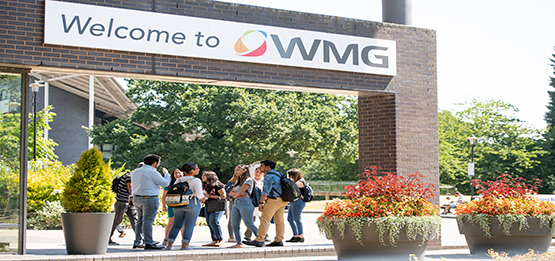Cyber Security Management (MSc) (2022 Entry)
About this taught graduate course
Course overview
Over the course of the year, you will develop a clear understanding of the cyber threat landscape and how a cyber incident may evolve. You will cover the key technologies required to defend and protect organisational information infrastructures from threats and attacks, and will learn how to manage and limit the impact an attack can have on a business.
You will focus on the strategic deployment and implementation of cyber security within an organisation: understanding the threat, managing resources, implementing solutions, and effectively communicating these to senior decision-makers, in order to support the strategic growth of a business.
This course draws extensively on current professional practices, and benefits from teaching input by cyber security professionals currently working in their areas of expertise. It also draws extensively on our world class research experience. During the course of studies, you will have opportunities to participate in research projects with leading researchers.
General entry requirements
Minimum requirements
2:i undergraduate degree (or equivalent) in IT, Computer Science, or a related subject.
Candidates with a UK 2:ii (or equivalent) may be accepted upon demonstration of relevant professional experience.
This course also caters for non-STEM graduates with a specific interest in cyber security.
English language requirements
You can find out more about our English language requirements. This course requires the following:
- Band A
- IELTS overall score of 6.5, minimum component scores not below 6.0
International qualifications
We welcome applications from students with other internationally recognised qualifications.
For more information, please visit the international entry requirements page.
Additional requirements
Candidates with professional experience should include their CV with their application.
Core modules
- Proactive Cyber Defence
- Managing Cyber Risk, Audit and Compliance
- Digital Forensic Investigation
- Management of Cryptosystems
- Penetration Testing
- Cyber Security Consultancy
- Study, Professional, and Analytical Skills
Optional modules
Alongside your core modules, you should select one of the following elective modules:
- Cloud Native Computing
- Enterprise e-Commerce Solutions
- Programming and Fundamental Algorithms
- Machine Intelligence and Data Science
Read the module descriptions for this course on WMG's website.
Teaching
This course has two components – a taught component accounting for two-thirds of your time and effort and a research component (dissertation) accounting for one-third.
For the taught component, we blend synchronous and asynchronous learning, delivered through lectures, seminars, lab work, syndicate exercises, simulations, and case studies. Modules are generally delivered intensively over one full week or two half weeks, and classes are deliberately kept small to encourage interaction. Our module leaders have extensive industry experience. Guest speakers from industry also contribute regularly, bringing real-world insight into your learning experience.
Our module leaders have extensive industry experience. Guest speakers from industry also contribute regularly, bringing real-world insight into your learning experience.
Class sizes
Overall this course can accommodate up to 52 students, divided into two classes of 26 students for most modules.
Typical contact hours
Our courses are modular in structure, with modules generally being taught in intensive one-week blocks from Monday to Friday, 9.00am - 6.00pm. Some modules will be taught over two half weeks or more, and occasionally you may be required to attend weekend sessions.
In addition to the taught component, you will have online pre-module preparation, and a substantial Post Module Assignment (PMA) following each module.
Each module accounts for 150 hours of learning time, divided between pre-work, in-module time, and post module assessment.
Assessment
At the end of each module, you will be given a Post Module Assignment (PMA) based on the learning objectives of that module. This is a piece of assessed written work which should take around 110 hours to complete. Most modules also have some in-module assessed work.
For the research component, each student undertakes a major individual project, which will develop your research and analytical skills and enable you to specialise. This project accounts for 33% of your overall credits and is submitted in the form of a dissertation.
Reading lists
Most departments have reading lists available through Warwick Library. If you would like to view reading lists for the current cohort of students you can visit our Warwick Library web page.
Your timetable
Your personalised timetable will be complete when you are registered for all modules, compulsory and optional, and you have been allocated to your lectures, seminars and other small group classes. Your compulsory modules will be registered for you and you will be able to choose your optional modules when you join us.
Scholarships and bursaries

Scholarships and financial support
Find out about the different funding routes available, including; postgraduate loans, scholarships, fee awards and academic department bursaries.

WMG funding opportunities
WMG will be awarding over £1million in scholarships and bursaries to students commencing study on our full-time MSc programmes

Living costs
Find out more about the cost of living as a postgraduate student at University of Warwick.

Find out how to apply to us, ask your questions, and find out more.

Taught course applications
Here is our checklist on how to apply for taught postgraduate courses at Warwick.

Application advice from WMG
Please see the WMG department web pages for specific application advice and information.

After you’ve applied
Find out how we process your application.

Applicant Portal
Track your application and update your details.

Admissions statement
See Warwick’s postgraduate admissions policy.

Join a live chat
Ask questions and engage with Warwick.
Postgraduate Open Day
Our Postgraduate Virtual Open Day will help you find out more about your course of interest, as well as general topics like applying to Warwick, accommodation, careers and funding.Postgraduate fairs
Throughout the year we attend exhibitions and fairs online and in the UK. These events give you the chance to learn about our Master's and PhD study routes, and the wider context of postgraduate study.
Live chats
Every week, you can connect directly with representatives from Warwick, who will be answering your questions on applying to and studying postgraduate studies at Warwick.
Departmental events
Some academic departments hold events for specific postgraduate programmes, these are fantastic opportunities to learn more about Warwick and your chosen department and course.
Connect with us
Want to hear more about postgraduate study at Warwick? Register your interest and find out more.


